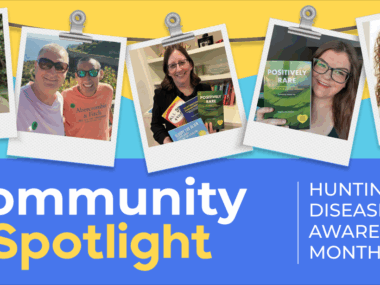How we’re learning to leave Huntington’s behind
Written by |
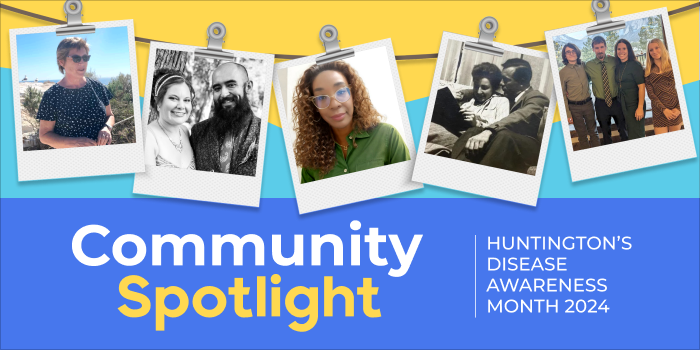
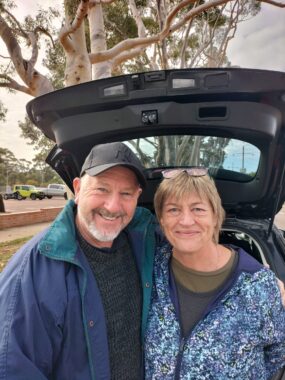
Phil and Sarah Morris live in Perth, Western Australia. (Photos courtesy of Sarah Morris)
This is Sarah Morris’ story:
Once you know, it just takes over.
For years it was the first and last thing on my mind every day. It was always in my head, always a worry. Will I have it? Will my brother and sister? Will our kids? Do I get tested?
All three of us siblings are positive for Huntington’s disease. Mum and Dad are devastated and feel so guilty.
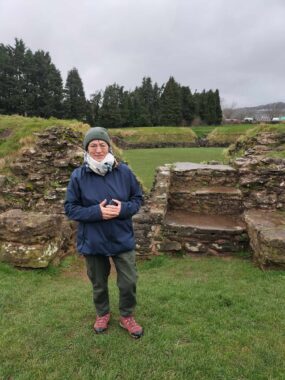
Sarah Morris visits Roman ruins at Caerleon in Newport, Wales.
My husband, Phil, and I already had two beautiful girls without the awful worries about whether to have kids or how best to have them. We still agonized, though, over how to tell them our status, or whether to leave that until they’re older.
You become immersed in Huntington’s disease because it’s not just you: It’s also your immediate family, including parents and siblings, and then the entire Huntington’s community at large. Everyone knows everyone else’s family story.
You don’t ever get a break from it. It affects every part of your life. It’s made me so emotional at anything and everything, like I’m at full capacity all the time.
Half my life has been just Huntington’s. My siblings and I have watched Dad die, and friends of Mum and Dad die. We’ve even seen friends our own age or younger die. That’s awfully scary.
Now I’m watching my sister and brother, who are both younger than me, get worse, and I’m worrying about Mum, who is worrying about them. It’s in your head all the time.
Our girls have both tested for Huntington’s: One is positive, the other negative. They’re both struggling with different things. I worry so much for them, and I worry for Phil, who’s worrying about the future and me.
I get involved in research at home — any study I can help with I will. I am also a strong advocate for support groups. These are people you’ll spend big chunks of time with, really get to know, and laugh and cry with.
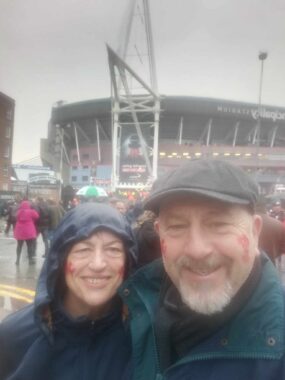
Sarah and Phil Morris watch a rugby match in the rain at Cardiff City Stadium, Wales.
I’ve also worked hard to reduce anxiety. I used to cry at the drop of a hat. My daughters wouldn’t talk to me about it because they didn’t want to upset me. That was easily fixed with medication. I should have done that very early on. Talk to a professional if you need to, take a break, or meet a friend for a chat.
Last year, after talking about it for years and getting a good telling off from the kids, we retired, sold our home, and in November set off for an 18-month trip. We’ve visited family all over the United Kingdom, and now we’re housesitting from Sandwich up to Shetland. We’re seeing places we’ve never been before, taking time to enjoy wherever we are, making memories, and taking it slowly.
The last three months have been surprisingly Huntington’s-free, other than some visits to Huntington’s friends, a 12-week, remote, brain-training study, and writing this story. Being away from the day to day, when Huntington’s is always around you, is lovely. I’ve actually had days when I don’t think about it at all.
We live in Perth, Western Australia, and get amazing support from Huntington’s Australia, the Neurosciences Unit, and some very passionate researchers. I don’t worry about myself so much. I’m 60 this year and I have Phil. I’ll be OK. I hope you all are, too.
Love and hugs to you all.
In recognition of Huntington’s Disease Awareness Month in May, the Huntington’s Disease Community Spotlight campaign features a series of stories highlighting the real-life experiences of people affected by Huntington’s, written in their own words. Follow us on Facebook and Instagram for more stories like this, using the hashtag #HDSpotlight, or read the full series.
